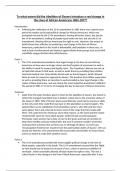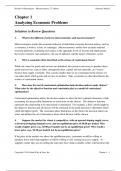To what extent did the Abolition of Slavery introduce a real change in
the Lives of African Americans 1865-1877?
Introduction:
Following the ratification of the 13 th amendment in 1865 there was a twelve-year
period of massive social and political change for African Americans, which was
prompted not only by the 13 th amendment, freeing all former slaves, but also by
the 14 th amendment, making all people equal under the law, but also the 15 th
amendment, allowing African Americans the right to vote. However, the extent to
which these were effective at producing a real change in the lives of African
Americans, particularly in the South is debateable, and loopholes in these acts, as
well as lack of enforcement and violence against blacks from groups such as the KKK
and White League did limit their effectiveness.
Point 1:
The 13 th amendment provided a clear legal change in the lives of most African
Americans as they were no longer slaves and had freedom of movement as well as
the ability to work for money and legally marry. The Freedmen’s Bureau was set up
to help black slaves to find work, as well as assist them by providing them clothes,
food and medical care. Many blacks found work as sharecroppers, which allowed
them to work for reward as opposed to slavery. The freedom from White supervision
as well as providing them an incentive to work provided a clear legal change in the
status of black Americans, and was clearly the most impactful amendment ratified in
the period of 1865-77 in terms of changing the day to day lives of African Americans.
However:
Aside from the basic freedom given to them by the abolition of slavery, the extent to
which this changed most black lives is limited, mainly due to the economic status of
the slaves in 1865. 90% of former slaves were illiterate, most had no money or skills
so the only work they could find was back on the plantation as sharecroppers. This
opened them up to exploitation from plantation owners, who still used the exact
same labour force and only had to share some of the crops that they made with
them. This could even be viewed as worse than slavery, as the work and the master
remained the same for many black people, whilst the job security had gone.
Previously, slave owners had a duty of care to the slaves and had an incentive to
keep them healthy and pay medical bills, but now if someone couldn’t work they
could just hire someone else as there was no shortage of labour. As Tuck says,
‘Emancipation freed former masters from the paternalistic duties of slavery’. We can
clearly see that the 13 th amendment did not provide only benefits for freed slaves,
and to an extent it made their position worse.
Point 2:
The 15 th amendment provided the most tangible political change in the lives of
black people, especially in the South. The 15 th amendment ensured that the ‘Right
to vote should not be denied on account of race, colour or previous condition of
servitude’, which essentially allowed all black males the right to vote. This was a
critical factor in the changes in the lives of black Americans, especially after it was













